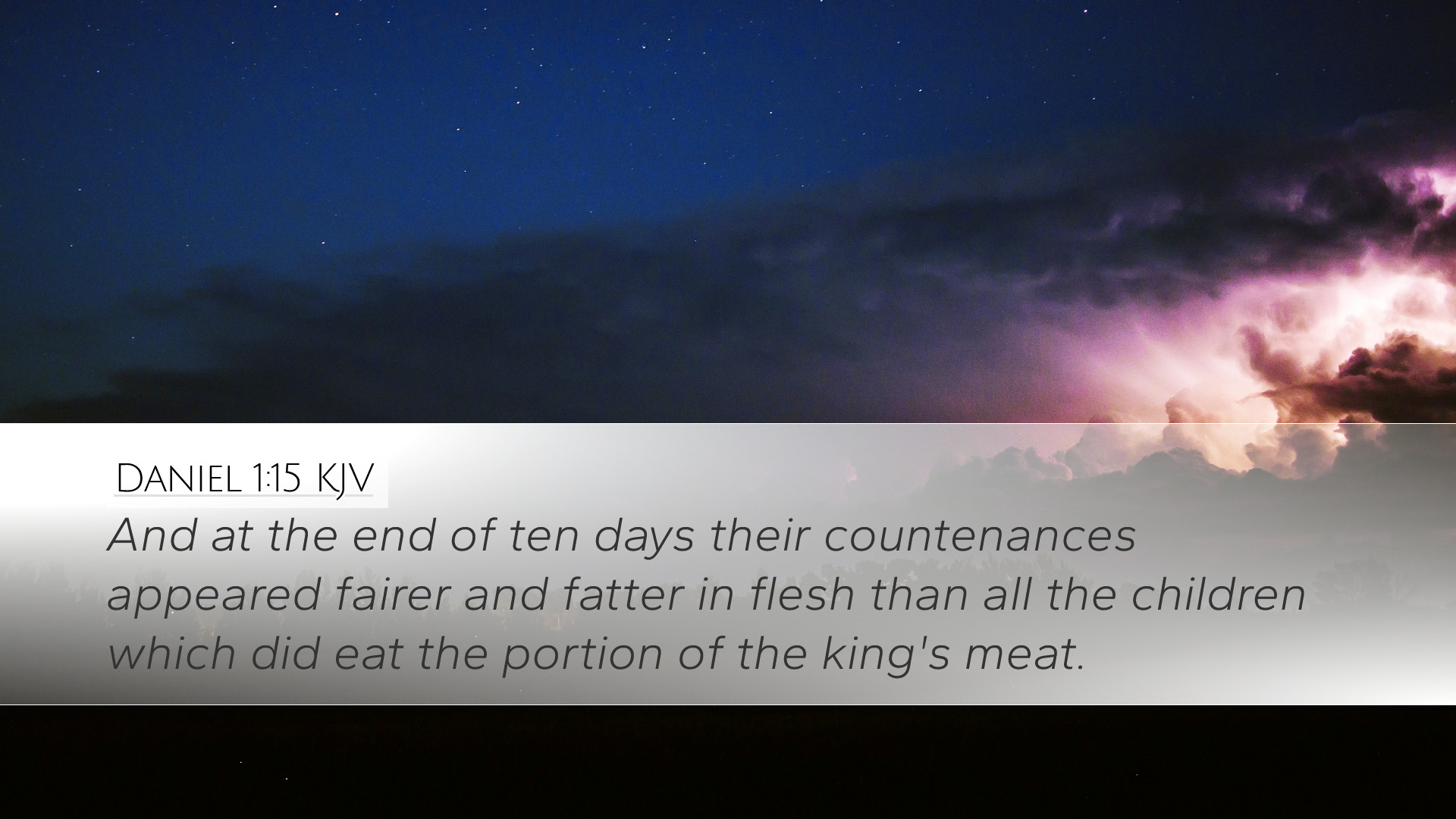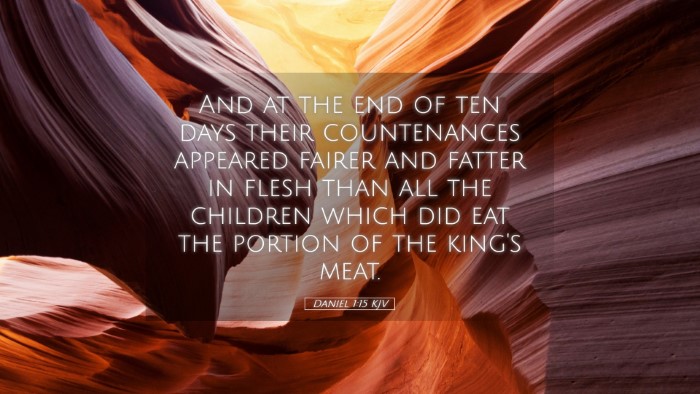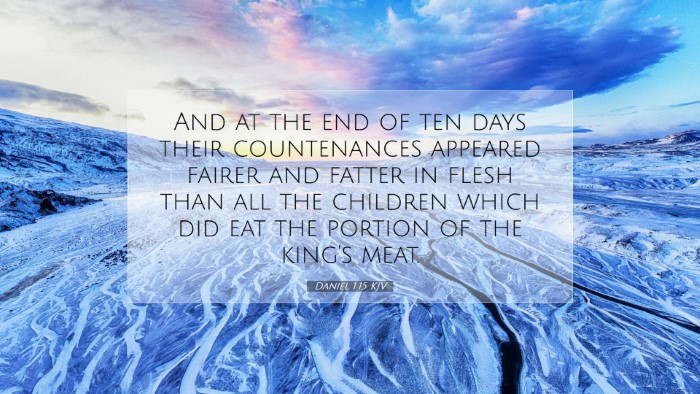Old Testament
Genesis Exodus Leviticus Numbers Deuteronomy Joshua Judges Ruth 1 Samuel 2 Samuel 1 Kings 2 Kings 1 Chronicles 2 Chronicles Ezra Nehemiah Esther Job Psalms Proverbs Ecclesiastes Song of Solomon Isaiah Jeremiah Lamentations Ezekiel Daniel Hosea Joel Amos Obadiah Jonah Micah Nahum Habakkuk Zephaniah Haggai Zechariah MalachiDaniel 1:15
Daniel 1:15 KJV
And at the end of ten days their countenances appeared fairer and fatter in flesh than all the children which did eat the portion of the king's meat.
Daniel 1:15 Bible Commentary
Commentary on Daniel 1:15
Daniel 1:15 states: "At the end of ten days their countenances appeared fairer and fatter in flesh than all the children which did eat the portion of the king's meat." This verse captures an important moment in the narrative of Daniel, reflecting themes of faithfulness to God, divine intervention, and the contrast between worldly provision and spiritual sustenance.
This commentary draws insights from various public domain sources, providing a comprehensive understanding suitable for pastors, theologians, and students of the Scripture.
Contextual Background
Daniel, along with his companions, is taken captive to Babylon during King Nebuchadnezzar’s reign. The young men are selected for their potential to serve in the king’s court. As part of their training, they are offered royal provisions, which include food and wine from the king's table. However, Daniel resolves not to defile himself with these provisions due to their possible association with pagan practices.
Spiritual and Physical Consequences
The ten-day dietary trial instituted by Daniel reflects not only a test of faith but also a demonstration of God's providence. The comparison of their appearance against those who consumed the king’s food illustrates a divine endorsement of Daniel's adherence to God's laws. It serves as a critical endorsement of spiritual integrity over temporal pleasures.
Insights from Matthew Henry
Matthew Henry emphasizes the importance of resisting temptation even in the face of significant pressure. He notes that the “king's meat” symbolizes the luxuries of life that might lead believers away from their covenant obligations. He observes that Daniel and his friends “cherished a relation to God” above all else, leading to a miraculous result observable in their countenances.
Physical Health and Spiritual Wellness
Henry also makes an intriguing point regarding the physical outcomes of their abstention. He argues that their healthier appearance was not solely due to diet but stemmed from divine favor, suggesting a connection between spiritual fidelity and physical well-being.
Insights from Albert Barnes
Albert Barnes provides a more detailed examination of the practical implications of Daniel's decision. He highlights that the “ten days” were sufficient for demonstrating the effectiveness of their chosen diet. Barnes stresses that the trust exhibited by Daniel is pivotal; here, abstaining from earthly delicacies results in a visible manifestation of God's provision and care for His people.
Divine Providence
In Barnes's view, the outcome of the ten-day trial is a reflection of God’s providence in the lives of those who commit to following Him. The fair and fatter appearance of Daniel and his friends serves not only as a personal testament but also as a public witness to the efficacy of God’s design for health and well-being.
Insights from Adam Clarke
Adam Clarke offers a deeper literary and theological exploration of the passage. He notes the significance of “countenance” in the Ancient Near Eastern culture, where physical appearance often signified favor or disfavor, both with God and man. The fairer countenance of Daniel's group was a statement against the prevailing beliefs of Babylon, which idolized worldly pleasures and power.
Covenant and Compromise
Clarke points out that this event was not merely about diet; it represented a larger theme of covenant faithfulness in a culture that often demanded compromise. The success of Daniel and his friends can be viewed as an encouragement for believers to stand firm in their identity and faith, especially when circumstantial pressures mount.
Theological Implications
The theological implications of Daniel 1:15 are profound. This narrative serves as a microcosm of the believer's experience in a secular world. The resolve demonstrated by Daniel signifies a fundamental attitude of resistance against the cultural norms that contradict biblical principles.
Faith and Obedience
The verse ultimately reflects a call to faith and obedience. The tangible results of the ten-day test suggest that God not only honors but rewards those who prioritize spiritual commitments over material sustenance. In contemporary terms, this verse challenges pastors and theologians to consider how faithfulness should inform the lives of believers in a culture that often demands compromise.
Conclusion
In conclusion, Daniel 1:15 serves as a reminder that God honors those who faithfully adhere to His desires and commands. Through their faithful decision to reject the king's provisions, Daniel and his friends exhibit profound spiritual integrity, resulting in a display of divine providence that affirms their faith. This passage encourages a vigilant stance against cultural assimilation and promotes a holistic understanding of well-being grounded in faithfulness to God.


